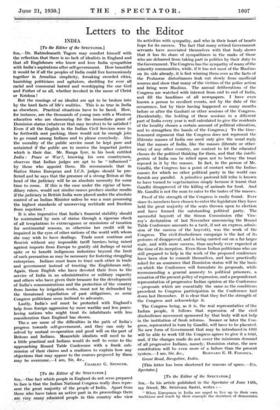[To the Editor of the SPECTATOR.] SIR,—One fact which people ,
in England do not seem prepared to face is that the Indian National Congress really does repre- sent the great majority of the people of India. Apart from those who have taken an active part in its proceedings there are very many educated people in this country who view its activities with sympathy, and who in their heart of hearts hope for its success. The fact that many retired Government servants have associated themselves with that body shows that it has its share of sympathisers in the ranks of those who are debarred from taking part in politics by their duty to the Government. The Congress has the sympathy of many of the minority communities, while, if it has not most of the Muslims on its side already, it is fast winning them over as the facts of the Peshawar disturbances leak out slowly from unofficial sources and show that many of the victims of the police action and firing were Muslims. The annual deliberations of the Congress are watched with interest from end to end of India, and fill the headlines of all newspapers. I have even known a person to recollect events, not by the date of the occurrence, but by their having happened so many months before or after the Gauhati or other sessions of the Congress. (Incidentally, the holding of these sessions in a different part of India every year is well calculated to give the residents of the locality chosen a certain amount of political education, and to strengthen the hands of the Congress.) To the time- honoured argument that the Congress does not represent the illiterate masses of India one need only give the usual reply that the masses of India, like the masses (literate or other- wise) of any other country, are content to let the educated classes do the political thinking for them, and that the intelli- gentsia of India can be relied upon not to betray the trust reposed in it by the masses. In fact, in the person of Mr. Gandhi, the Congress has a point of contact with the Indian masses for which no other political party in the world can furnish any parallel. A primitive pastoral hill tribe is known to have turned to vegetarianism simply because it learnt that Gandhi disapproved of the killing of animals for food. And Mr. Gandhi is not the man to cater to the tastes of the masses.
Proof of the strength of the Congress is easily found. Ever since its members have chosen to enter the legislature they have held the great majority of the seats thrown open to election and have formed the outstanding political party. The • successful boycott of the Simon Commission (the Vice- roy's declaration of last November announcing the Round • Table Conference amounts to a tacit, if not an express, admis- sion of the success of the boycott), was the work of the Congress. The civil disobedience campaign is the last of its gestures of disapproval, and is being carried out on a far larger scale, and with more success, than anybody ever expected at the time of its inception. Even those Indian politicians who are still prepared to help in the work of the proposed conference have been slow to commit themselves, and have practically asked for an assurance that Dominion status will be the basis on which the Conference will formulate its proposals, while recommending a general amnesty to political prisoners, a cessation of the present policy of repression, and a preponderant representation of progressive Indian opinion at the Conference —proposals which are essentially the same as the conditions precedent to Congress participation in the Conference laid down last December. It is clear that they feel the strength of the Congress and acknowledge it.
The Congress being, as it is, the real representative of the Indian people, it follows that repression of the civil disobedience movement sponsored by that body will not help in the institution of fresh reforms. Sooner or later the Con- gress, represented in turn by Gandhi, will have to be placated. No new form of Government that may be introduced in 1031 will be able to work till the Congress agrees to give it a trial, and, if the changes made do not cover the minimum demand of all progressive Indians, namely, Dominion status, the new constitution will be even more of a failure than the present
[This letter has been shortened for reasons of space.—En. Spectator.]








































 Previous page
Previous page